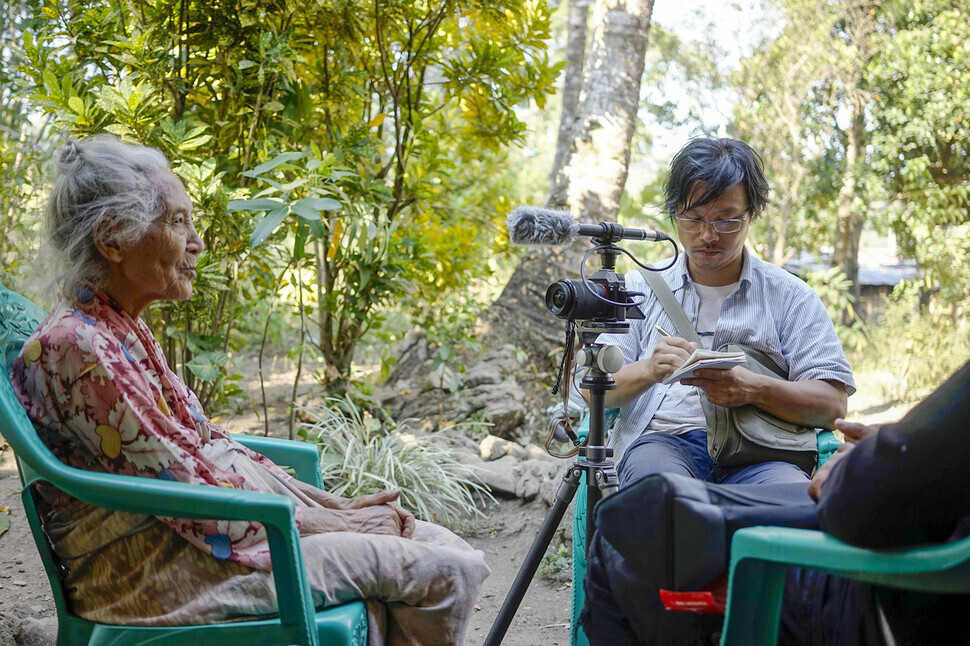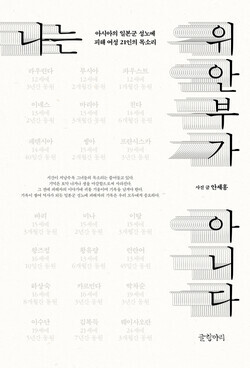hankyoreh
Links to other country sites 다른 나라 사이트 링크
[Book review] Zainichi photographer tells stories of over 140 former comfort women throughout Asia
Ahn Se-hong’s book “I Am Not a Comfort Woman” contains images of 21 survivors

Ren Lan’e. Wei Shaolan. Hwang Yu-rang. Kim Bok-deuk. Park Cha-soon. Ha Sang-sook. Inez. Francisca. Carminda. Fausta. Raulinda. Lucia.

These names belonged to women across Asia -- in South Korea, East Timor, Indonesia, and elsewhere -- who survived the experience of serving as Japanese military “comfort women.” Ahn Se-hong, a Zainichi Korean photographer, has met with over 140 survivors throughout Asia over the past 25 years. In the book he presents images of 21 of them, along with records of their lives. Ahn previously requested a lawsuit to demand damages for the unilateral cancelation of a 2012 comfort woman photo exhibition by Nikon Salon in Tokyo’s Shinjuku area, and played a leading role in the eventual court victory.
Ahn began his effort to record the faces and accounts of the survivors after a 1996 experience covering the House of Sharing, a home for comfort women survivors, while working as a photojournalist for a magazine. In March 2012, he began the Layer by Layer Project to support and archive information about comfort women survivors in Asia.
Ahn has traveled all the way to the Philippines, Indonesia, and East Timor to meet the survivors, whose stories remained virtually unknown by the international community. More than anything, he felt that the historical facts surrounding the comfort women survivors were “not simply a matter between South Korea and Japan, but a question of war and human rights spanning various countries in Asia.”
For the survivors the pain is ongoing. Bari, a 93-year-old survivor in Indonesia, describes still being “afraid something might happen to be every time I see a strange man.” Lucia, a 90-year-old survivor, said she “constantly has nightmares about being raped.” Ahn said his meeting with Carminda, an East Timorese survivor who passed away in 2016, was an indelible experience. “I can still vividly remember meeting her,” he said in a telephone interview with the Hankyoreh.
“She was suffering from Alzheimer’s disease, and when she was unable to remember things from the past, her younger sister began talking about how she was taken to the comfort station. All of a sudden, she started saying numbers in Japanese and grimaced. At the time, I thought, ‘She may have lost her memory, but the trauma lingers for a long time.’”
The title of the book, “I Am Not a ‘Comfort Woman,’” comes from one of the things Ahn most often heard while interviewing the survivors. For this reason, he made a point of using the term “survivor of sexual slavery” instead of “comfort woman” in the book. Not one of the women that Ahn met with had volunteered to be a “comfort woman.” Some had been raped and taken to comfort stations by Japanese soldiers while at home with family or while walking on the street; others had been deceived by promises of a “good job.”
The survivors who met with Ahn lamented the fact that no real surveys of their situation have taken place. Mina, a survivor in Indonesia, voiced indignation of the lack of full-scale investigations. Even when investigations into their victimization have taken place, institutional care for the elderly survivors has been sorely lacking.
“I was raped by the Japanese military. The Japanese government needs to apologize to me,” the survivors said -- but the only reply is an echo.
Only 17 survivors still aliveMore and more eyewitnesses to history have been passing away. Of the 21 women whose stories were included in Ahn’s book, eight have since died. In South Korea, just 17 survivors remain among the 238 women registered as victims of the comfort women system.
“Over time, their voices have been fading away,” Ahn said. “The memories fragment, or they vanish with death. We need to listen to what the survivors have to say and leave a record before that happens. Just as history is formed from records, the records of the survivors of sexual slavery by the Japanese military are important to us all.”
By Huh Yoon-hee, staff reporter
Please direct comments or questions to [english@hani.co.kr]

Editorial・opinion
![[Editorial] Intensifying US-China rivalry means Seoul must address uncertainty with Beijing sooner than later [Editorial] Intensifying US-China rivalry means Seoul must address uncertainty with Beijing sooner than later](https://flexible.img.hani.co.kr/flexible/normal/500/300/imgdb/original/2024/0517/8117159322045222.jpg) [Editorial] Intensifying US-China rivalry means Seoul must address uncertainty with Beijing sooner than later
[Editorial] Intensifying US-China rivalry means Seoul must address uncertainty with Beijing sooner than later![[Column] When ‘fairness’ means hate and violence [Column] When ‘fairness’ means hate and violence](https://flexible.img.hani.co.kr/flexible/normal/500/300/imgdb/original/2024/0516/7417158465908824.jpg) [Column] When ‘fairness’ means hate and violence
[Column] When ‘fairness’ means hate and violence- [Editorial] Yoon must stop abusing authority to shield himself from investigation
- [Column] US troop withdrawal from Korea could be the Acheson Line all over
- [Column] How to win back readers who’ve turned to YouTube for news
- [Column] Welcome to the president’s pity party
- [Editorial] Korea must respond firmly to Japan’s attempt to usurp Line
- [Editorial] Transfers of prosecutors investigating Korea’s first lady send chilling message
- [Column] Will Seoul’s ties with Moscow really recover on their own?
- [Column] Samsung’s ‘lost decade’ and Lee Jae-yong’s mismatched chopsticks
Most viewed articles
- 1For new generation of Chinese artists, discontent is disobedience
- 2[Editorial] Transfers of prosecutors investigating Korea’s first lady send chilling message
- 3[Column] US troop withdrawal from Korea could be the Acheson Line all over
- 4[Photo] 1,200 prospective teachers call death of teacher “social manslaughter”
- 5[Exclusive] Unearthed memo suggests Gwangju Uprising missing may have been cremated
- 6[Column] When ‘fairness’ means hate and violence
- 7Xi, Putin ‘oppose acts of military intimidation’ against N. Korea by US in joint statement
- 8S. Korea “monitoring developments” after report of secret Chinese police station in Seoul
- 9China calls US tariffs ‘madness,’ warns of full-on trade conflict
- 10[Editorial] Intensifying US-China rivalry means Seoul must address uncertainty with Beijing sooner t